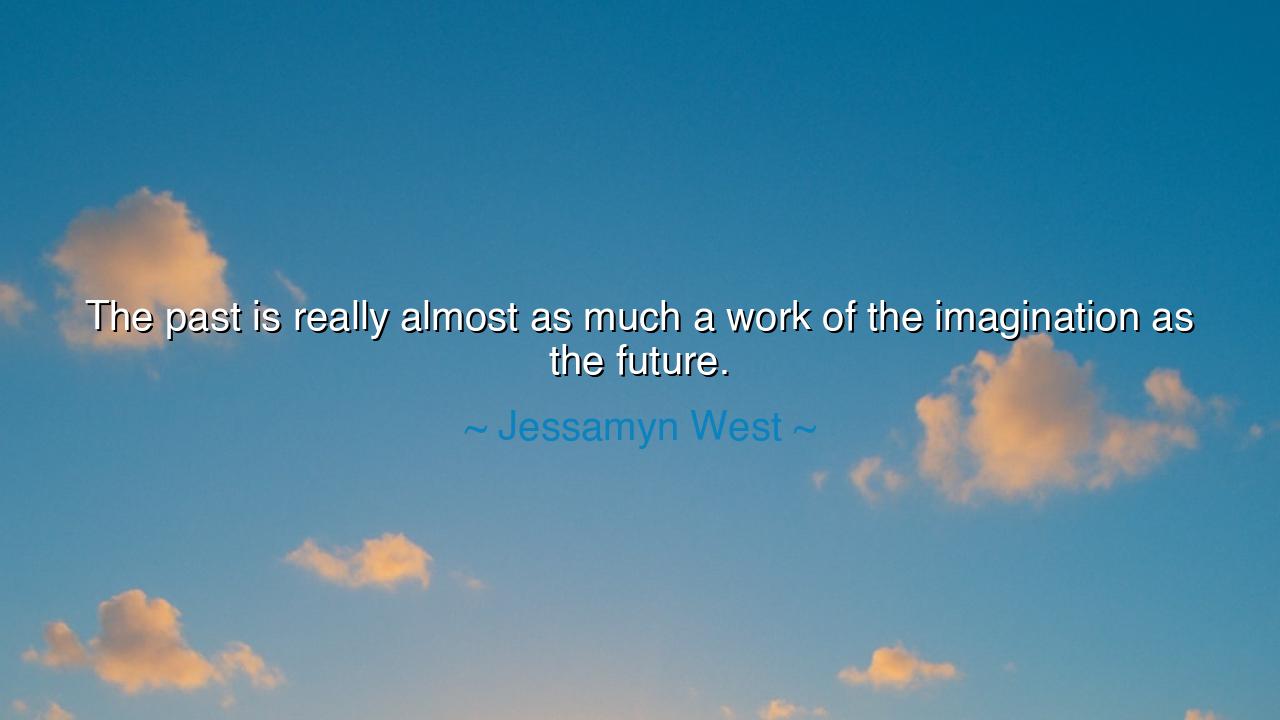
The past is really almost as much a work of the imagination as






In the vast continuum of time, there is a profound truth that we, as humans, often fail to recognize: both the past and the future are shaped by the lens through which we view them. Jessamyn West’s words, "The past is really almost as much a work of the imagination as the future," speak to the idea that history is not merely a factual recounting of events, but rather a story we tell ourselves, colored by our experiences, biases, and aspirations. What we call the past is not a static, immutable set of facts, but a narrative that we continually reinterpret and reframe. In this sense, the past is as much a creation of our minds as the future, a canvas upon which we project our interpretations and hopes.
In the ancient world, history was often recorded not just as it happened, but through the lens of myth and legend. The stories of Homer—whether in the Iliad or the Odyssey—were not mere chronicles of events, but grand narratives woven with divine intervention, human folly, and epic heroism. These tales were shaped by the imagination of those who told them, as much as by the deeds themselves. The Greeks, like all peoples, understood that the past could not be fully known or understood without a certain degree of imagination—the minds of the storytellers infused the past with meaning, just as our minds do today when we reflect on our own histories. The past, like the future, is an act of interpretation, and we are its artists.
Consider the way the Romans viewed the foundation of their empire. The story of Romulus and Remus, the legendary founders of Rome, was passed down through generations as a symbol of the strength, resilience, and divine favor of their civilization. While the tale may have had elements of truth, it was also shaped by the imagination of those who sought to define their city’s identity. Rome’s past was thus not merely a record of kings and emperors, but a mythic narrative designed to inspire and unite its people. In this way, the past was reimagined over time, not only to remember what happened but to define who the Romans were and what they stood for. In this light, the past is as much a product of the imagination as the future is, for both serve to guide the present and shape the identity of a people.
The same principle holds true in our own lives. Reflecting on our personal past, we often find that it is less about exact events and more about how we interpret those events. The stories we tell ourselves about our childhood, our triumphs, and our failures, are shaped by our emotions, desires, and experiences. In truth, our past is a narrative we constantly reshape to make sense of the present, to justify our actions, or to give meaning to our suffering. The wisdom of the ancients teaches us that history, both personal and collective, is not an objective truth, but a living story we continually mold with each passing day.
Consider the philosopher Socrates, whose life and death were recounted through the lens of those who loved him, like his student Plato. Plato’s writings, such as the Apology, preserved Socrates’ defense of his ideas, but these works were not mere records of what happened. They were interpretations of Socrates’ philosophical vision, passed down through generations as a guide to wisdom and ethics. Through Plato’s imagination, Socrates became more than a philosopher who questioned society; he became the symbol of the philosophical life, a legacy that has shaped thought for centuries. In this way, the past becomes an artistic interpretation, a story retold with each new generation to inspire and guide.
The lesson we draw from West’s reflection is that both the past and the future are woven together by the same human faculty—the imagination. We often see the past through the lens of our current needs and beliefs, just as we project our hopes and fears onto the future. What we remember and how we remember it are deeply intertwined with who we are in the present. Similarly, the future, though it is yet to come, is shaped by our present actions, desires, and interpretations of what we wish it to be. In truth, we are the authors of both, for it is in the stories we tell—whether of the past or of what is yet to come—that we find meaning and purpose.
The practical action here is to recognize that both the past and the future are within our control. By understanding that the past is shaped by our own interpretations, we can reframe our own narrative to heal from past wounds, to understand ourselves more clearly, and to take charge of our present. Do not let the past define you, but rather shape it into a story of resilience and strength. Similarly, as we look to the future, let us approach it not with fear, but with the understanding that we have the power to create a future that aligns with our values, hopes, and dreams. We are both the authors and the readers of our lives, and it is up to us to make the story a great one.






AAdministratorAdministrator
Welcome, honored guests. Please leave a comment, we will respond soon